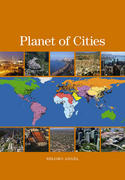For the past century, California, particularly Southern California, nurtured and invented the suburban dream. The sun-drenched single-family house, often with a pool, on a tree-lined street was an image lovingly projected by television and the movies. read more »
Planning
Time to Acknowledge Falling Private Car Use
The prospect of falling car use now needs to be firmly factored into planning for western cities.
That may come as a bit of a surprise in light of the preoccupation with city plans that aim to get people out of their cars, but it is already happening. And it is highly likely to continue regardless of whether or not we promote urban consolidation and expensive transit systems. read more »
Dispersion in the World's Largest Urban Areas
No decade in history has experienced such an increase in urban population as the last. From Tokyo-Yokohama, the world's largest urban area (population: 37 million) to Godegård, Sweden, which may be the smallest (population: 200), urban areas added 700 million people between 2000 and 2010. read more »
- Login to post comments
Hong Kong’s Decentralizing Commuting Patterns
Hong Kong is a city of superlatives. Hong Kong has at least twice the population density of any other urban area in the more developed world, at 67,000 per square mile or 25,900 per square kilometer. The Hong Kong skyline is rated the world's best by both emporis.com (a building database) and diserio.com, which use substantially different criteria. read more »
Separation of Church and Urban Planning
Recently, the Journal of the American Planning Association (JAPA) published research that directly challenged prevailing views in urban planning. In an article entitled Growing Cities Sustainably, Marcial H. Echenique, and Anthony J. read more »
A Housing Preference Sea Change? Not in California
For some time, many in the urban planning community have been proclaiming a "sea-change" in household preferences away from suburban housing in the United States.
Perhaps no one is more identified with the "sea-change" thesis than Arthur C. Nelson, Presidential Professor, City & Metropolitan Planning, University of Utah. Professor Nelson has provided detailed modeled market estimates for California in a paper published by the Urban Land Institute, entitled The New California Dream: How Demographic and Economic Trends May Shape the Housing Market: A Land Use Scenario for 2020 and 2035 (He had made generally similar points in a Journal of the American Planning Association article in 2006). read more »
Postwar Prefabs: Britain's Factory-Made Palaces
After the financial crisis of 2008, much of Great Britain's construction industry capacity was wiped out. Now, in 2012, there is much fear that the “traditional” construction industry is too weak to rapidly increase the rate of housing production, even if the administrative planning system wanted it to. Which it doesn’t. read more »
The Land Premium That's Punishing Property
High land prices have all but killed the Australian housing industry.
Lower housing starts has led to lower GST revenues (house construction attracts full GST) and lower stamp duty receipts are crippling state budgets and cruelling the chances of low and middle income earners to get a start in the housing market.
What has caused this slump in housing starts? Land prices. read more »
A Planet of People: Angel's Planet of Cities
Professor Shlomo Angel's new book, Planet of Cities, seems likely to command a place on the authoritative bookshelf of urbanization between Tertius Chandler's Four Thousand Years of Urban Growthand Sir Peter Hall's Cities and Civilization and The Containment of Urban England. Chandler produced the definitive volume of gross population figures for urban areas (cities) over millennia. Angel, takes the subject much further, describing detail how urban areas have grown over the last two centuries, both in population and continuous urban land area. The book focuses principally on population growth, urban spatial expanse, and density. read more »
Florida: When Your Best (Place) Just Ain't Good Enough
Real estate broker Coldwell Banker handles corporate relocations for a large portion of our middle class. It recently released a survey of Suburbanite Best Places to Live. While it's easy to dismiss as a sales tool for their realtors, the survey provides a fascinating glimpse of middle class, suburban preferences, influenced by our current economy. Coldwell Banker’s top honors go to Cherry Hills Village, Colorado, a suburb of Denver. read more »





















